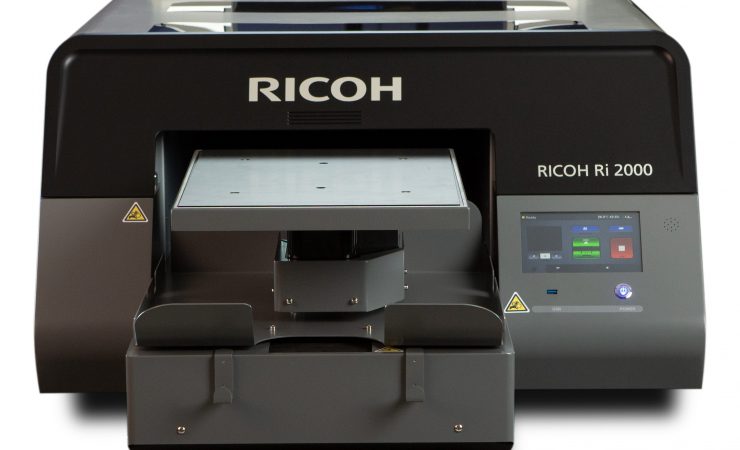Ricoh has reached a collaboration agreement with Morbach, Germany-based textile ink specialist Farbenpunkt to offer the latter’s PeractoJet inks for digital textile printing to Ricoh’s OEM printhead customers as part of an environmentally attractive package for direct-to-fabric / direct-to-garment printing.
Said to be ‘ideal’ for apparel and home furnishing applications, the PeractoJet ink significantly reduces the amount of water and energy required and concomitant carbon dioxide emissions. While conventional fabric dyeing and pre- and post-print treatments account for a fifth of waste water worldwide, the new combination is claimed to deliver over 90% savings in fresh water use and waste water production, while cutting energy use by half.
It achieves this by eliminating the need for energy- and water-intensive pre- and post-treatments, said to be equivalent to up to €0.90 more square metre of printed fabric, potentially twice the cost of the ink. Hot air fixation in two to four minutes is carried at out ‘relatively’ low temperatures between 140 and 160° C. The ink uses nano-sized dye particles which bind both mechanically and chemically to the fibres and the one ink works with natural, synthetic and mixed fabrics.
PeractoJet inks comply with the EU’s Reach regulations and also have an Oeko-Tex Eco-Passport certification. The water-based inks also emit no VOCs. Initially the inks will be offered by Ricoh to its OEM printhead customers; Ricoh’s own textile printing line at present consists of the Ri-prefixed series of DtG printers, the most recent addition to which was the Ri 2000, announced in September 2020. Given the company’s moves into the wide-format sector in recent years, it seems reasonable to speculate that a direct-to-fabric printer roll-fed printer might be in development.
Graham Kennedy, director of Industrial Print at Ricoh Europe, said. ‘This collaboration builds on Ricoh’s long-standing history of innovative inkjet head development and allows us to support a production sector looking for ways to address growing questions around sustainability. Digitally producing textiles with vastly reduced water waste and eliminating energy intensive pre- and post-treatment stages delivers huge environmental benefits. This disruptive ink offering therefore enables more cost effective production and allows manufacturers to consider establishing local production capabilities through reshoring. This is especially important now when we are seeing a growth in o- demand digital production spurred on by the impact of the pandemic on consumer habits and business operations. Our Farbenpunkt partnership is good news for manufacturers and their shareholders, textile printers and consumers.’
Farbenpunkt managing director Etienne Steveninck, added. ‘Working with Ricoh allows us to bring this high performing, versatile ink to a wider audience. It will enable textile manufacturers to produce large volumes, quickly, on a range of materials, meet strict accreditation standards, and contribute to the sustainability of our planet. The two companies are a natural fit as the wellbeing of our environment is part of Ricoh’s DNA too.’
The Farbenpunkt inks are available immediately across the EMEA region to RIcoh OEM customers.

